- Home
- Jeff Mariotte
The Folded World Page 2
The Folded World Read online
Page 2
Mostly, when he looked at her, he saw the most beautiful woman he had ever met, and more and more often he found himself wondering if what he felt was love or just something very much like it.
And then there was Stanley Vandella. O’Meara saw the way Vandella stared at her, and it was like watching his own reflection in a mirror. Vandella felt the same way he did, and if Tikolo had a preference between them, she didn’t let on.
That couldn’t last much longer. O’Meara tried to pretend it didn’t matter to him, that he was fine with any decision, or the lack thereof. But as his feelings deepened—and already his heart seemed to stop every time he got a glimpse of her in the corridor, much less touched her velvet skin or earned a smile or a kiss—he knew he wouldn’t be able to stand it much longer. At some point, she would have to choose. She could pick him or she could pick Stanley or she could even say that she would continue on with both of them, but she would have to definitively say where her heart was.
Three
Kirk sat at the desk in his quarters, answering communications and checking over status reports from crew members and Starfleet headquarters back on Earth. Running a starship sometimes meant making snap life-and-death decisions or facing down existential threats, but more often than not it was a matter of dealing with the forms, reports, and queries common to bureaucracies across the known universe. Right now, he would willingly have swapped all the busywork for a single megalomaniac determined to rule his quadrant of space.
So when he heard the door buzzer, Kirk was delighted at the interruption. “Come,” he said, knowing that the number of people who would have interrupted him was a small handful.
The door opened and Doctor Leonard McCoy walked in, his expressive brow furrowed. He was carrying a bottle and two shot glasses. Without a word, he poured out two fingers. The doctor raised his glass and offered, “Uncle Frank.”
Kirk raised his own glass and drank. The captain suppressed a cough. “Red-eye whiskey, Bones?”
“I remember you telling me it was his favorite. Not one of mine.” McCoy took the visitor’s chair and poured them both another shot. He sat looking down, swirling the whiskey along the sides of the glass.
“Spit it out, Doctor.”
“I just had a visit from Petty Officer Tikolo,” McCoy said.
“How’s she doing?”
“Without jeopardizing patient confidentiality, I can say that she’s better than she has a right to be.”
“As the captain of this ship, I have a right to know about crew—” Kirk began, but McCoy cut him off.
“I know, Jim. You’re the captain. I’m the chief medical officer. That means I have to balance priorities. I’m tryin’ to thread a needle, here.”
Kirk settled back in his chair. “Thread away, Bones. Tell me what you can.”
McCoy leaned casually on his right armrest. “You’re aware of her situation.”
“Of course.” About a year ago, a Romulan bird-of-prey had violated the Neutral Zone, established after the Earth-Romulan War, and had attacked a series of Federation outposts established to keep an eye on the zone. The Enterprise had destroyed the Romulan ship—learning, in the process, that the Romulans had developed cloaking technology that, despite some flaws, was more effective than anything in Starfleet’s bag of tricks—but not before the Romulans had vaporized several of the outposts.
Miranda Tikolo had been assigned to Outpost 4 for just over a year when the attacks came. A skilled pilot, she had been flying a cargo run between Outposts 3 and 4 when the Romulans struck. Witnessing the destruction of the outpost and her crewmates—and, via her instruments, the pitched battle between the Enterprise and the Romulans—she had shut off all the shuttle’s systems and drifted in space, hoping not to be noticed. Once the battle was over, she had hailed the Enterprise. They had picked her up, astonished to learn that there was even a single survivor from Outpost 4.
Tikolo had been appreciative, and had enjoyed her time on board the starship. When Starfleet’s medical personnel cleared her for duty, she requested assignment to the Enterprise, which the captain had gladly approved. She had been part of the security detail for seven months now, and Kirk was happy with her performance.
“Given what she went through—all those hours in the dark, alone, floatin’ in space, watchin’ her crewmates killed right in front of her—it’s no surprise that she continues to have some psychological scarring. Those scars don’t go away.”
“Bones, are you saying there’s a problem?”
“I wouldn’t call it that, exactly. She’s been havin’ nightmares. I think they were prompted by that Ixtoldan battle cruiser accompanying us on this trip. She’s only had a glimpse of it, and while it doesn’t look much like a Romulan bird-of-prey, I expect she’s conflated the two in her mind.”
“She can’t expect to serve on a Starfleet vessel and never encounter an alien ship,” Kirk said.
“I’m sure she doesn’t. And I should add that I don’t believe she’s a danger to herself or anyone else. It’s just that the bad dreams bothered her enough that she felt it necessary to tell me about them. It’s classic survivor’s guilt, Jim. I can say that I understand, but—”
All at once the captain understood what his friend was asking. “Doctor McCoy, you are overstepping—”
“No, I’m not. The crew knows about Tarsus IV. Tikolo needs someone she looks up to. She needs an Uncle Frank.”
Finally Kirk said, “Okay, Bones. As soon as I get a chance—”
The boson’s whistle announced a call from the bridge, and Uhura’s voice followed. “Captain,” she said. “We’re receiving a distress hail from the U.S.S. McRaven.”
The McRaven was a Starfleet ship that had left Earth a few days before the Enterprise, her mission so classified that even Kirk didn’t know what it was. Because she was following essentially the same course as the Enterprise, he assumed the mission had something to do with their own: ferrying Minister Chan’ya and her retinue to Ixtolde, along with the Federation delegation. Ixtolde was an impoverished planet, the sole inhabited world in its solar system. But its populace had acquired the capability for interstellar travel, and had applied for Federation membership. Everybody wanted it to happen. Trade helped make planets prosperous, and Ixtolde had untapped mineral resources to which others wanted access. The idea was that the Enterprise and the Ton’bey, the Ixtoldan battle cruiser, would arrive together in Ixtoldan space. Other Ixtoldan ships would meet them there, and the combined delegations would be shuttled to the planet’s surface for a grand entrance.
The diplomats were negotiating with Chan’ya en route, and once they reached Ixtolde they would embark on a fact-finding tour of the world, to ascertain that it met the Federation’s membership requirements. Kirk wasn’t sure how the McRaven fit in, but he was convinced it had a role to play.
“How far behind are we?” Kirk asked.
“The McRaven appears to be immobilized,” Uhura reported. “Although it has been four days ahead of us, at our current speed we’re only about a day behind.”
“Do we know the nature of their emergency?”
“No, sir. I’ve been trying to raise them, without success. We’re just getting the automated distress call.”
Kirk met McCoy’s gaze. One of the doctor’s eyebrows arched slightly. The captain knew well what that meant. He was curious, too. “Inform the Ixtoldan ship. Intercept course. Warp six,” he said. “I’m on my way.”
• • •
By the time he and McCoy reached the bridge, Gonzales and a couple of the other diplomats, Perkins and Rinaldo, were already there. So were Minister Chan’ya and three additional members of her party. Ixtoldans were generally humanoid in appearance, but with skin that appeared at most times to have been dusted with gold. The colors of the crystalline matter creating that impression could change, under intense emotional stimulus, turning a glowering purple when an Ixtoldan was angry and a deep sea green, according to reports, when sexually aroused. Chan�
�ya’s had been a pale gold as long as Kirk had known her, although he noticed as he stepped off the turbolift that it was slightly more pronounced than usual.
The minister was shorter than Kirk and broader through the shoulders, with thick arms and legs and a sturdy torso. She wore a floor-length dress that appeared to be composed of a series of ribbons partially interwoven and wrapped tightly around her, in various shades of red and yellow. Her hair was pulled back off her face and braided into shoulder-length coils, each braid comprising white, gold, and silver strands. Kirk had not spent a lot of time with her, but he knew her well enough to realize that although her even-featured, seemingly guileless face appeared to betray an utter lack of sophistication, that was an illusion. She was not to be underestimated.
The other two Ixtoldans were even taller than Gonzales, towering over their minister, and both thin as rails. This told Kirk that Ixtoldans were a physically diverse people, similar in coloration but not necessarily in size and build.
Chan’ya greeted Kirk with a challenge. “Are we to understand, Captain, that our arrival at Ixtolde is to be delayed?” She spoke in a low, throaty mumble, hard to hear, but with each word distinctly pronounced. Her English was almost without accent.
“I’m not sure yet,” Kirk replied. “A Federation starship is in some sort of trouble. We’ve increased our speed, and since the McRaven was following what appears to be the same course that we are, we are not necessarily losing any time. But it depends on what we find when we reach her.”
“Still, we must register a protest. Our schedule is inviolate.”
“Surely you understand, Captain Kirk,” Gonzales added. “We’ve been invited as guests to their planet, and the schedule was established well before we left.”
“I do understand,” Kirk said. Turning to the Ixtoldan, he said, “I’m sorry, Minister Chan’ya. This can’t be helped. I know you’re not suggesting that we ignore a distress call.”
“We suppose that we cannot,” Chan’ya said with resignation. “But we expect that the utmost haste will be expended in addressing the situation, whatever it might be.”
“Believe me,” Kirk said, “if the McRaven’s in trouble and there’s something we can do to help, we won’t waste any time.” He glanced toward Gonzales. “I’d expect Federation personnel to understand that.”
“Oh, of course,” Gonzales said quickly. “Obviously, the safety of the ship and crew are the first priority. All I’m saying is, let’s keep our mission schedule in mind.”
Kirk held his tongue. What he wanted to say would not have been at all diplomatic. Finally, he trusted himself to speak again. “Of course.”
“Very well, then.”
Chan’ya gave Kirk a look that he couldn’t quite read. She might have been wishing some painful and long-lasting death for him, or she could simply have been checking the color of his eyes. Or searching for that damn twinkle. During the time she’d been on the ship, he’d had a hard time reading her moods or her body language. But her skin turned slightly rosy, almost like a blush, and she pressed her hands against her sides and rushed from the bridge. Her retinue followed just as swiftly. None of them had uttered a word, but as the turbolift doors closed, the tallest of them shot Kirk an angry glare. His skin darkened, his lips drew back to expose a row of sharp yellow teeth, and his nostrils flared.
There was no mistaking the meaning of that.
Four
Doctor McCoy escorted the Federation delegation off the bridge as the captain took his seat, for the moment content to watch his crew do what they did so well. They were seasoned professionals and they worked with the crisp efficiency that he enjoyed, the way that some people did a well-choreographed ballet.
After a few minutes he heard his first officer punching buttons. “Is everything okay, Mister Spock?” he asked.
“We appear to be having an instrument malfunction, Captain. I am unable to determine the cause.”
“It’s here too, Captain,” Chekov said anxiously. “Either we’re spinning in circles, or my instruments are completely haywire.”
Kirk stood up, leaning forward to check Chekov’s display panel. “Mister Sulu?” he asked.
“Aye, Captain,” Sulu reported. “I believe our systems are still functional at this point, and we remain on a steady course. But you wouldn’t know it from the readings I’m getting.”
“Captain?” Uhura said.
“Yes?”
“When you asked me about the McRaven’s course, she was following the same course that we had observed, until about this point. Then she diverted, rather markedly.”
“So you’re thinking there’s something about this location that interferes with a ship’s instrumentation. And when the McRaven went off course, it ran into trouble.”
“It’s a theory, sir.”
“One with which I concur, Captain,” Spock said. He was bent over his console, trying to rein in his instruments. From what Kirk could tell, without notable success.
“Engineering to bridge!” The voice over the intercom belonged to Chief Engineer Montgomery Scott. “Captain! I dinna know what’s goin’ on with the instruments here, but I’m losin’ all control of the engines!”
“Full stop,” Kirk instructed.
“Full stop,” Sulu repeated, already moving to implement the command.
“Far as I can tell, Captain, we’re stopped,” Scotty said a moment later. “It’s hard t’ know for certain.”
Kirk rose from his chair and went to the viewscreen. Even in the depths of space, with all the starship’s environmental controls and artificial gravity fully functional, there was a faint but constant sensation of motion. He didn’t sense it now. “I believe we are,” he said. “Now, reverse thrusters. Slow and steady. Let’s back out to where things started going haywire.”
The slightest lurch indicated that the Enterprise was once again in motion. Most people—those not as attuned to the rhythms of the vessel as he was—would not have felt it. Even Kirk couldn’t have said definitively whether they were moving forward or back. He trusted his crew, though, and both Scotty and Sulu had said they were losing control, not that control had already been lost. Given that, he believed a controlled reverse was achievable, and if Spock was right about the source of the instrument trouble, then getting out of range of whatever had caused it might set things straight.
He returned to his chair, but he didn’t have to wait long for the answer. “Instruments normal,” Sulu said after a few minutes.
“Here too, Captain,” Uhura added.
Kirk touched his intercom controls. “Kirk to engineering,” he said. “What about you, Mister Scott? Back to normal?”
“Aye, Captain, it seems so,” Scotty said.
“We’re going to stay put and try to figure out what’s going on,” Kirk said. “We’ll probe the vicinity from here and see what we find.” He rose from the chair again. “Call me when you learn something,” he added. “I’ve got to pay someone a visit.”
• • •
He found Miranda Tikolo in her shared quarters. When she called out for him to enter, her voice sounded far away. He went in and she was sitting on the edge of her bed, her eyes vacant. After he stood there a moment, she focused on him.
“Captain,” she said. “This is . . . a surprise.”
“I just wanted to drop in, see how you’re doing,” he said.
She smiled. He had heard that the petty officer was the subject of possible romantic interest from more than one member of the ship’s crew, and seeing the way her smile lit the room, he understood why. “Okay,” she said. Her tone was sincere, in his judgment. And a person didn’t become a starship captain without plenty of experience reading other people. “Captain, I want to thank you again for making me part of your crew.”
“No thanks necessary,” he said. “You earned that.”
“Still, I—”
“Miranda,” he interrupted. “I know you’ve been talking with Doctor McCoy, and that’s good. W
hat you’ve been through isn’t easy, but it’s a load you don’t have to carry alone. I want you to understand that you can talk to Bones, you can talk to me—this ship is full of sympathetic ears.”
“Thank you, sir. I understand.”
He wasn’t sure he was making himself clear. Tikolo’s verbal responses seemed to indicate that he was getting through, but her facial expression hadn’t changed. She looked like someone pretending to appreciate her gifts at a party, where the givers were watching her open every package. “There will be plenty of times when others are counting on you. You just need to know—”
She started to reply, but the intercom system cut her off. “Bridge to Captain Kirk,” Uhura said.
He went to the wall unit and activated it. “Kirk here.”
“Captain, I think we’ve found something.”
“What is it?”
Instead of Uhura’s voice, he heard the first officer’s. “You need to see this for yourself, Captain,” Spock answered. “It is most unusual.”
Five
When Kirk stepped onto the bridge, everybody was staring at the viewscreen. It only took him an instant to understand why.
“The anomaly you see, Captain,” Spock explained, “is what we believe to be the cause of our instrument malfunction.”
“We were heading straight for it, Captain,” Sulu said. “See that speck near the center? That’s the McRaven.”
“Enlarge,” Kirk said.
“Aye, sir.” Sulu touched a button and the image on the screen was magnified. It looked like nothing Kirk had ever seen. What should have been the black emptiness of deep space was instead shot through with jagged strands of green light that were constantly shifting. It reminded Kirk of nothing so much as electricity arcing from one point to another. The stars on the far side of the strange energy field behaved oddly, too—instead of giving off their usual brittle glow, they seemed to pulse, appearing to grow and shrink, and at the same time becoming more and less distinct.

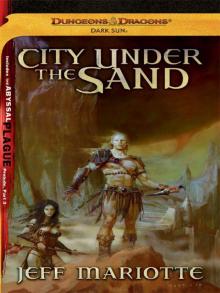 City Under the Sand
City Under the Sand The Burning Season
The Burning Season Sanctuary
Sanctuary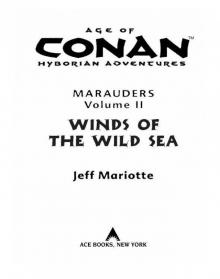 Winds of the Wild Sea
Winds of the Wild Sea Serpents in the Garden
Serpents in the Garden Close to the Ground
Close to the Ground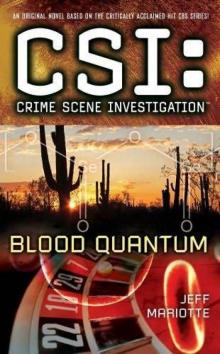 Blood Quantum
Blood Quantum Brass in Pocket
Brass in Pocket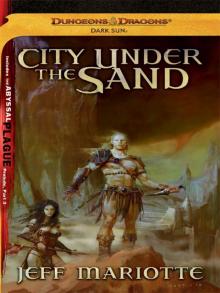 City Under the Sand: A Dark Sun Novel (Dungeons & Dragons: Dark Sun)
City Under the Sand: A Dark Sun Novel (Dungeons & Dragons: Dark Sun)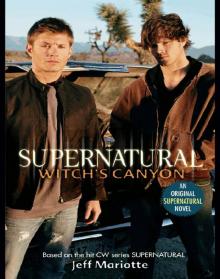 Witch's Canyon
Witch's Canyon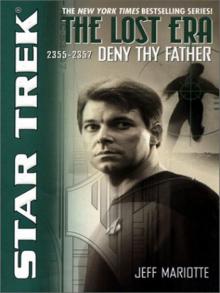 STAR TREK: The Lost Era - 2355-2357 - Deny Thy Father
STAR TREK: The Lost Era - 2355-2357 - Deny Thy Father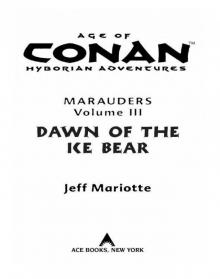 Dawn of the Ice Bear
Dawn of the Ice Bear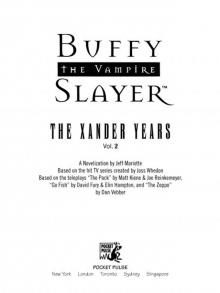 The Xander Years, Vol.2
The Xander Years, Vol.2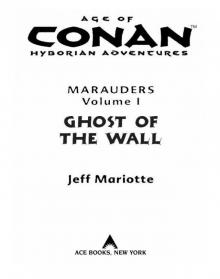 Ghost of the Wall
Ghost of the Wall 30 Days of Night: Light of Day
30 Days of Night: Light of Day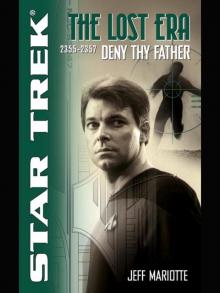 Deny Thy Father
Deny Thy Father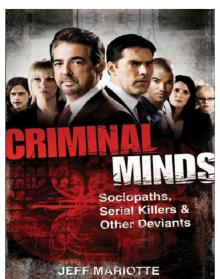 Criminal Minds
Criminal Minds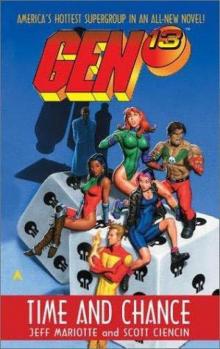 Time and Chance
Time and Chance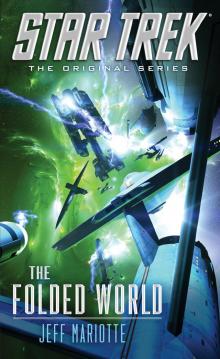 The Folded World
The Folded World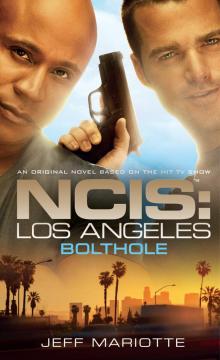 Bolthole
Bolthole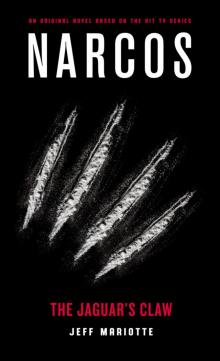 Narcos
Narcos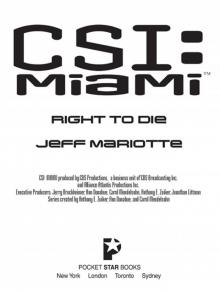 Right to Die
Right to Die